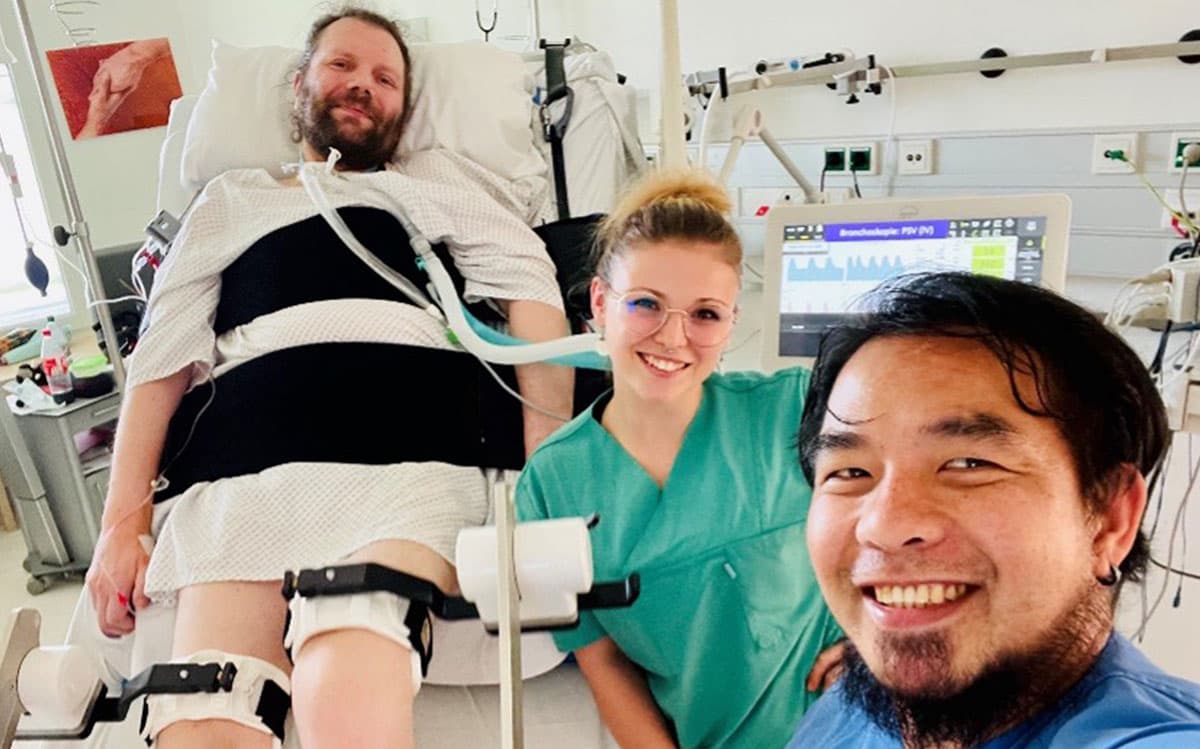FIELD REPORT: HILBO
In Cooperation with Schön Klinik Bad AiblingHilbo (mid-40s) is a patient in the intensive care unit at the Schön Klinik Bad Aibling Harthausen. Originally from Oldenburg, he now lives in Munich. From his room walls, which are almost completely wallpapered with children’s pictures and photos, it is easy to see that Hilbo has a family: a young daughter and his wife. Smiling, Hilbo says that his family is his greatest happiness.

Fig. From left to right: Hilbo, Angi (RR) and Troy (SKBA)
Nevertheless, there is a reason why Hilbo is in intensive care. He tells us that it all started in December 2022. Suddenly in his daily life, he noticed that his motor skills in his left leg were deteriorating. With symptoms getting worse and worse, a long series of visits to the doctor followed shortly after. Many doctors with different opinions, a lot of examinations and finally the diagnosis ALS (Amyotrophic lateral scelrosis). A serious result that brings a drastic change in life.
However, nothing that the family could not master together. With a lot of support from his loved ones, the new everyday life was set up. However, in mid-July came the next stroke of fate: Hilbo had contracted pneumonia. For healthy people this is no problem, but for him it meant an artificial coma and artificial respiration.
Now in mid-August, after two weeks in an artificial coma, he is undergoing treatment in intensive care at the Schön Klinik Bad Aibling Harthausen. Shortly after his arrival there, he was mobilized with our VEMOTION® system.
When asked how he perceived the first mobilization with VEMOTION®, he told us that it was initially challenging to position the seat roller correctly (to stabilize the patient during raising), but after that he had felt safe the whole time and found it pleasant to be raised. Especially the verticalization was a plus for him, since standing otherwise is no longer possible for him. Conventional mobilization can only be carried out to a limited extent, since Hilbo can no longer actively move his legs and put weight on them. Only the transfer with the lift into the wheelchair and the supported mobilization to the edge of the bed can be realized in the conventional way at the moment.
We asked Hilbo for his opinion about VEMOTION® therapy. Hilbo simply answers that it is definitely a great additional support to the conventional exercise therapies. From his point of view, many more patients could benefit from VEMOTION®. He also has the feeling that his muscle tone in his right leg is getting better as a result. He had never completely lost this and this minimal hope of improvement makes him want to continue. During mobilization, he pays close attention to the swings in the activity of his legs, which he can follow on the monitor of the VEMOTION® system. Of course, he remains realistic and assures us that he naturally knows what the diagnosis ALS means for him.
Therefore, his conclusion: A very good alternative to the usual mobilization, nevertheless it remains exciting how the effect of our therapy will be noticeable to him in the further course. The result is also important to us, so we look forward to seeing Hilbo again soon.
Without the support of the nursing staff in the intensive care unit at the Schön Klinik Bad Aibling Harthausen, our vision would not be possible. We would like to thank them for their active support and wish Hilbo all the best for his future, so that he can soon return to everyday life with his family. Because that is his wish, to be able to actively participate in life for a long time to come, for his daughter and for his loved ones.